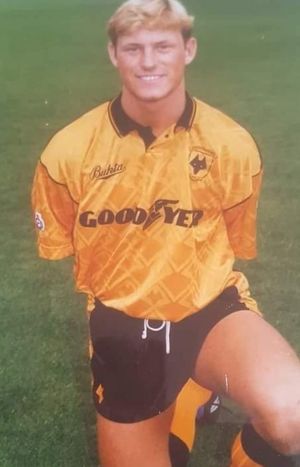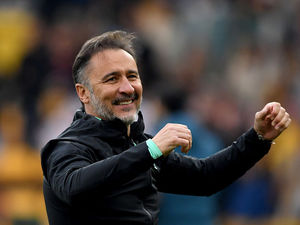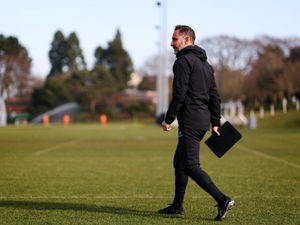The former Wolves fab four who never made the grade at Molineux
It is early Friday evening at the Cleveland Arms, a couple of miles out of Wolverhampton City Centre.
Watch more of our videos on ShotsTV.com
and on Freeview 262 or Freely 565
Just a regular night in the popular sports bar, with a few commuters popping in for a quick post-work snifter, others readying themselves for a more sustained session on the beers, and several donning belated Halloween fancy dress.
From one table in the middle of the pub, the hubbub of conversation is punctuated by regular explosions of raucous laughter. A stream of one- liners, and relentless mickey-taking and nostalgic storytelling. Even without knowing, you can almost guess that these are former footballers. It’s the unmistakable ambiance of pure and unadulterated dressing room banter, recreated some three decades on.
Stuart Leeding, Dave Read, Steve Morgan and Andy Harnett were together within the youth ranks at Molineux some 30 years ago. Part of a Band of Brothers setting out on the long and winding road to pursue their dreams both in football and in life. They are joined by Daz Taylor, not a Wolves youth player at the time, but a close friend of them all. They haven’t met up for a while. But it feels like it was only yesterday. Their shared experiences are such that they are always intertwined.
The fact is, none of the quartet made it at Molineux. None even managed to forge a professional career at football league level. But they will always, always, have the memories.
“Just imagine it,” says Leeding. “At that age, and all you had to do was play football, and have a laugh with your mates. Every single day. The fitness side, the banter. What more could you ask for?”
“We were living the dream,” adds Read. “Back then you could say absolutely anything to each other and get away with it!”
“The banter we had was something else,” says Harnett. “Even now, I think we can just look into each other’s eyes and it all comes back and we can relive it all over again!”
“I played for my local football club and the one I support, and I don’t think there is ever anything that can beat that,” Morgan explains.
Over 90 minutes, appropriately, the quartet go through those old memories. The good, the bad, and the ugly. There is way too much discussed to be included here. And some not necessarily fit for public consumption. But the team spirit, togetherness, camaraderie. It’s like it has never been away.
They are even more boisterous than the group in fancy dress.
Ask about their career paths before landing a YTS spot or apprenticeship at Wolves and a host of well-known local clubs are mentioned. And some well-known local coaches.
Leeding, a left back, Read, a central midfielder, Morgan, predominantly a right midfielder who sometimes covered as sweeper, and Harnett, a target man centre forward, all enjoyed similar routes to Molineux via either established junior or representative teams.
Black Country Bullets. Romulus. Dovedale Dynamos. Cresswell Wanderers. Forest Star. Lichfield Social. Albion Rovers. Lane Head Strollers. Just some of the clubs enjoyed along the way coupled with the representative league sides which propelled the four into the shop window to attract the attention of Wolves.
Coaches who played key roles in their respective developments include Mel Beechy and Tony Painter whilst Morgan’s Dad ran Black Country Bullets. And legendary scout Ron Jukes was also involved in the respective, and very different, journeys that took the aspiring young players through the School of Excellence, training at Castlecroft and the gym in the old Molineux Hotel, to the two years as full-time scholars, and, in some cases, professionals.

For all of them, being able to represent Wolves, for all bar Lichfield-born Read their home city, was paramount. Leeding, perhaps the closest to breaking into the first team having also narrowly missed out on the FA’s School of Excellence at Lilleshall, also had interest from Manchester United and Arsenal before effectively agreeing a five year deal at 14 which was a mixture of two years as a schoolboy, two more as an apprentice and one as a professional.
“I had been going to Wolves, Arsenal and Manchester United during the school holidays, but the age that I was, staying with my home club was always my first choice,” he admits.
Read’s Dad was good friends with former Wolves defender John Pender, which was one notable factor in his signing, while Harnett and Morgan were both impressing in league and representative football in the area, and are both Wolves fans.
If the quartet’s journeys were very different, one similarity which they all reflect on with complete confidence, is that they never really felt they had a chance to establish themselves at Wolves.
It was an era when very few players came through the ranks to reach the first team, also partly because of the rebuilding job needed in the late Eighties that prompted Graham Turner to engineer a fairly direct route to redemption after the turbulent travails of the previous three years.
“I think what stood out for me during our time was that not many youth team players were making it through to the first team,” says Harnett.
“It felt like a lot of people just weren’t given a chance.”
“I remember going to a Friday night game at Molineux between Wolves and Scarborough, which finished 0-0,” adds Morgan.
“I was in an executive box with my mum and dad, and I remember my mum asking Ron Jukes how many players on the pitch had come from the youth team.
“His reply was, ‘would you like another cup of coffee, Mrs Morgan’?
“She pressed him again and he said the answer was none, there just wasn’t the opportunity to be part of the first team set-up at that time.”
As to that style of play, for Leeding, at left back, it was made crystal clear.
“Training for me was always about opening my body up and just playing a channel ball down the line for the forwards to run on to – simple as that.
“That is how I was coached, just chuck it down the side, which is how it worked for the first team who had Bully (Steve Bull) and Mutchy (Andy Mutch) up front.
“There was no chance to express yourself and play the ball inside.
“If the central midfielders came looking for it, I just had to ignore them.”





